Hudson Valley Drinks Producers Redefining the Farm-to-Glass Movement
If New York is a body, the Hudson Valley is its heart—literally and symbolically.
Not only do the region’s farms produce the oxygen and nutrients we need to function, they are also synonymous with the love, pride, and sense of hope that the Empire State offers to so many people around the world. With 30,650 farms now in New York State, having seen a 14% decrease between 2012 and 2022, farmers increasingly are relying on other forms of income to make ends meet. We’ve witnessed a turn to value-added agricultural goods.
For some, that means concocting creative jams, sausages, even soaps and lotions from farm-fresh locally grown ingredients. In other cases, the result is a cascade of beverages.
In the Hudson Valley, liquid locavorism is redefining sustainability, in all of its forms.
HOLISTIC SUSTAINABILITY
At Seminary Hill Catskills, co-founder Susan Manning explains that everything they do is, ultimately, a labor of love designed to reinvest in Callicoon, Sullivan County. Her husband and co-founder, Doug Doetsch, grew up in Callicoon and claims family going back five generations. He recalls watching sunsets from where their organically farmed cidery and restaurant now stand. Just down the street, the pair also have a small hotel offering private apartment-style accommodations.
Initially, under the advice of Michael Phillips, widely considered a top expert on organic cider apple cultivation, they planted cover crops to revitalize the soil. Then between 2014 and 2019, they planted hundreds of apple trees, and some pears. In all, they have more than 60 varieties of cider and dessert apples and pears producing fruit. They opened their award-winning boardinghouse and the cider house, which also features a restaurant using local ingredients.
For Manning and Doetsch, the quality of the cider is foundational to their enterprise, but themission of Seminary Hill is more holistic than “just” creating a well-made drink.
“We wanted to embrace sustainability in all of its dimensions,” Manning explains. “That meant farming organically and planting trees that would take longer to grow but would last for generations. It meant ensuring that all of the food we serve comes from 30 miles away or less. It meant building our cidery in the most sustainable way possible, and using energy responsibly. It meant using an existing building and antique furniture for the boardinghouse. It means employing local people.”
In the 1970s, when Doetsch left Callicoon for the Midwest, there wasn’t an option to return and work in a service industry that paid a living wage.
“The economy was just decimated, and there was nothing,” Manning explains. “Part of our vision was creating a sustainable business that could support the local community and draw visitors from afar.”
Now, in addition to making an artisanal product and offering a place for people to eat and recreate, the pair are contributing about $1.2 million in labor costs annually to the local community, which is finally starting to hum again. For examples, visitors need only look down the hill from Seminary, where they’ll find local treasures like Catskill Provisions Distillery and Callicoon Brewing Company.
COMMUNITY & CONNECTION
Jacqui Ferrari and Dan Heavens, partners in life and business at Quartz Rock Vineyard and Cider House in Marlboro, which they purchased in 2019, had been visitors since 2006, and wanted to maintain its traditions: “It was so clear to me that the farming came first,” says Ferrari.
“The property is 54 acres, and right now we have 15 acres of grapes, four acres of apples, eight acres of peaches, a couple of acres of cherries, and small amounts of pears, quince, currants, strawberries, and gooseberries,” Heavens says. “Everything we bottle is grown on the estate.”
The pair are working toward a sustainability certification with the New York Wine & Grape Foundation, and would love to farm everything organically.
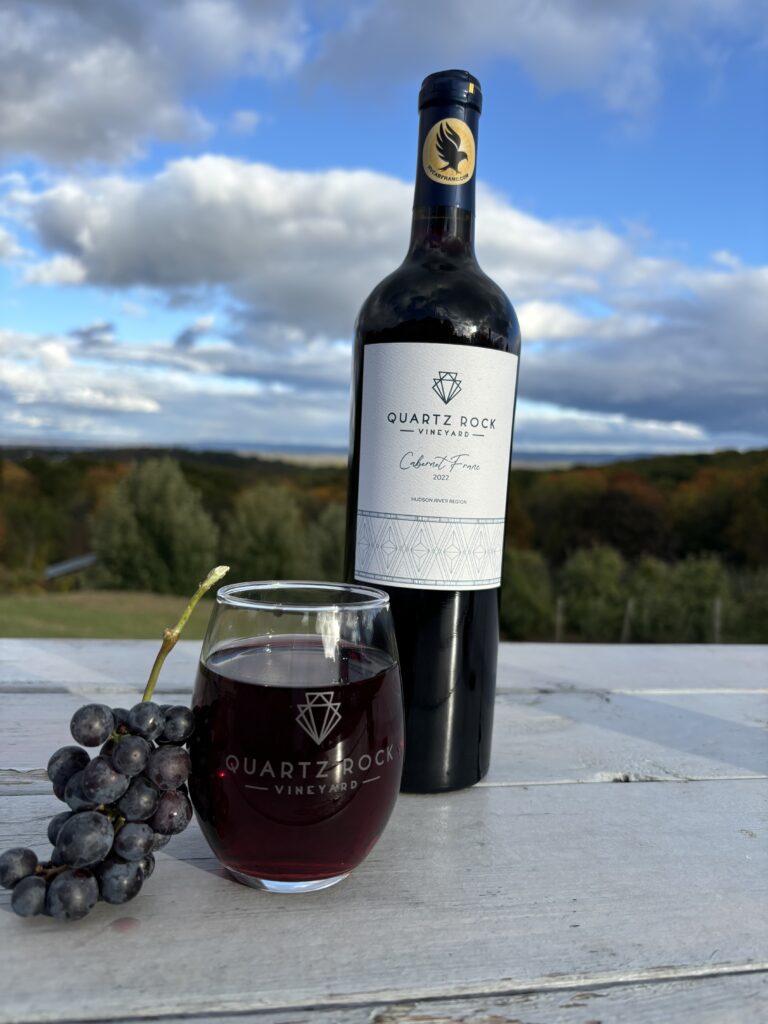
“We have three young children, and we live on the farm, so we do everything as sustainably and safely as we can,” Heavens says. “But it isn’t always cut-and-dried because organic sprays have environmental drawbacks too, so we really just focus on health and safety first.”
They also grow fruit to feed people, selling their fruit through CSAs and farmstands, and donating two pieces for every one sold in a CSA to a food pantry and community center. “We think everyone should have access to fresh food,” says Heavens.
Currently, Quartz produces around 1,500 cases of wine and cider. Ferrari and Heavens are hoping to continue to grow and connect with people both on the farm (the tasting room is open every weekend), and in the market through both their wines and fresh fruit.
“Everything we do is by hand, from growing and harvesting the fruit to bringing it to market, or bottling it,” Ferrari says. “For us, every step of the way, it’s about community and connecting with the land and each other.”
DON’T LEAVE A TRACE
A desire to do things holistically while still thriving and growing animates the team at Catskill Brewery, founded with the goal of making excellent beer and serving as a gathering space for the community.
“Because it was founded by three local craft beer lovers who are also deeply invested in the pristine environment here, making sure everything was done the right way was part of Catskill’s DNA from the beginning,” says Mike McQuiston, head brewer and alchemist. The founders—Randy Lewis, Ramsay Adams, and Kirt Gunn—are avid fly fishermen and they volunteer with local community organizations. “But they also wanted the brewery to bring in jobs and tourism dollars to the area,” he says.
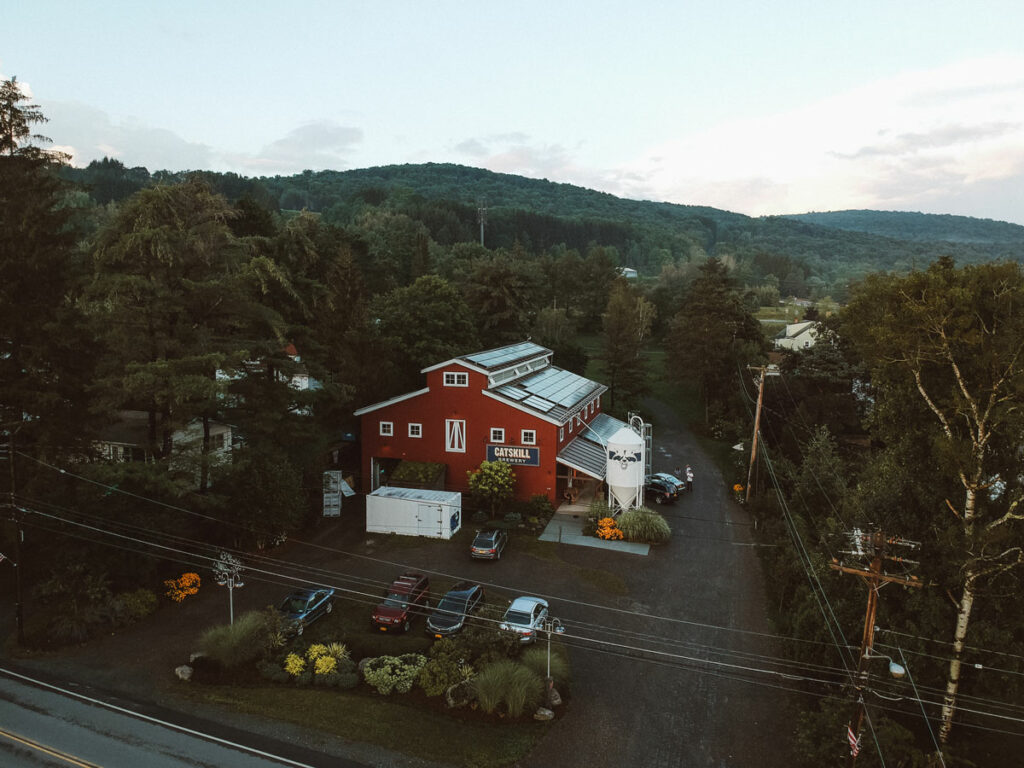
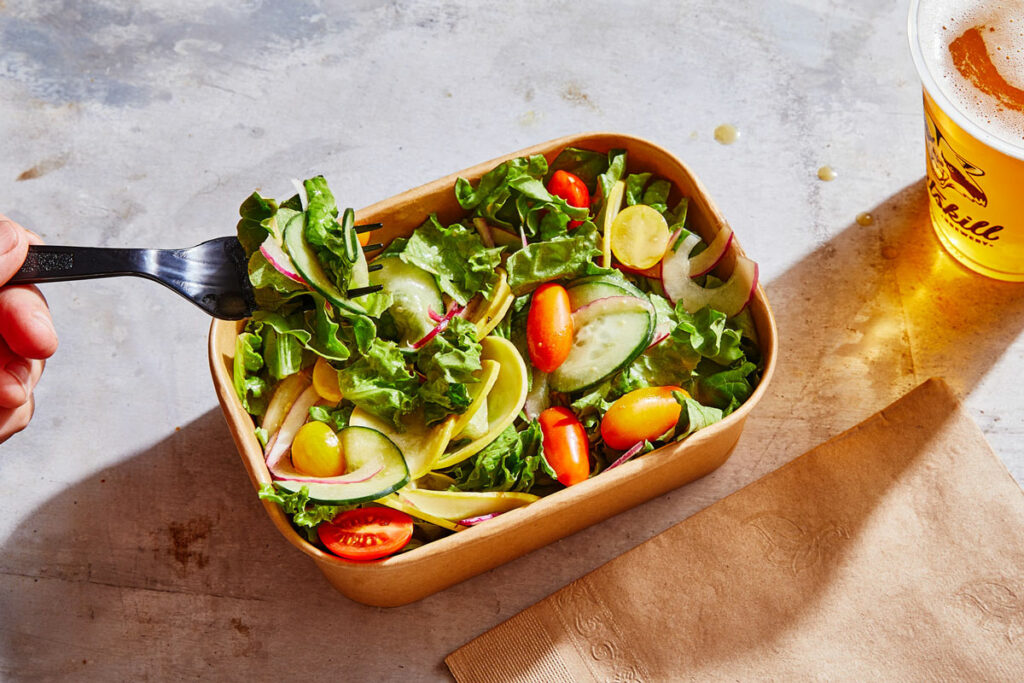
Catskill Food Truck photography by Bryan Gardner
The 7,050-square-foot facility is LEED Gold certified, a green building certification that means it was designed and built, and is operated, in an energy-efficient way that reduces the environmental impact. The building’s energy is powered by the sun and earth, and waste is kept out of the waterways. Many of the materials for the taproom come from reclaimed barnwood, and locals and visitors gather to listen to neighbor musicians and get seasonal snacks from the Catskill Food Truck.
“My favorite item from the food truck is the venison sausage,” McQuiston says. “The venison comes from down the road. The farmer there gets all of our spent grain and feeds it to the deer, so it’s a full-circle moment.”
In a national environment where 399 craft breweries closed their doors in 2024, Catskill Brewery’s beers and approach are resonating regionally and beyond. They have increased their reach, year over year, and hope to open new markets and partnerships this year across New York, especially in the metropolitan area.
INFUSING CULTURE, NEW AND OLD
Using local resources while also educating minds and expanding palates is key to Dassai Blue’s paradigm. The Hyde Park sake brewery is the second to open in New York, and the fruit of a partnership between the Japanese sake brand Dassai and the Culinary Institute of America.
“Sake represents just 0.2% of the market share for alcoholic beverages in the U.S., but there’s an increase in well-crafted sake,” says Jocelyn Heyward, senior brand manager at Dassai. She explains that sake is brewed like a beer from rice, instead of more common grains, but is meant to be enjoyed like a wine.
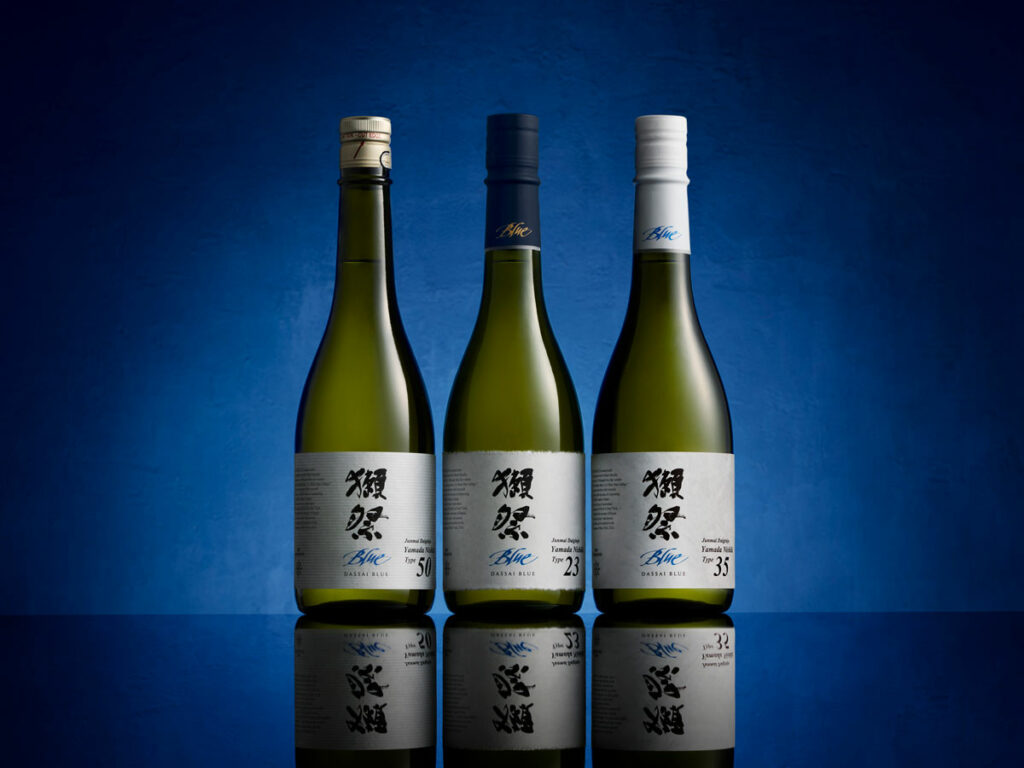
Dassai Blue only produces sake that is classified as Junmai Daiginjo, which means that their rice is polished to 50% of its original size (The more “polished” the grain, the more superior—and pricey—the spirit). Last year, they saw 11,000 people swing by for tours and tastings at their 55,000-squarefoot distillery, learning about the historic drink (it goes back to 300 BCE) and then enjoying a tasting paired with sushi.
“The sake here is different from the sake we produce in Japan, and it really reflects the place,” Heyward says. They use New York water, and have been working with Isbell Farms in Arkansas to produce a U.S.-grown version of the Yamada Nishiki rice that goes into their product. “We are incredibly proud of the partnership and the sake it creates,” she says.
Local Sips That Stand Out
The vast majority of a wine, beer, or spirit’s carbon footprint comes from how far it traveled to get to you. Make greener sipping decisions without sacrificing taste with these locally made libations.
Milea Estate Vineyard: Founded by Barry and Sang Milea with the goal of creating sustainably farmed, meticulously produced wines that reflect the terroir of the Hudson River Valley.
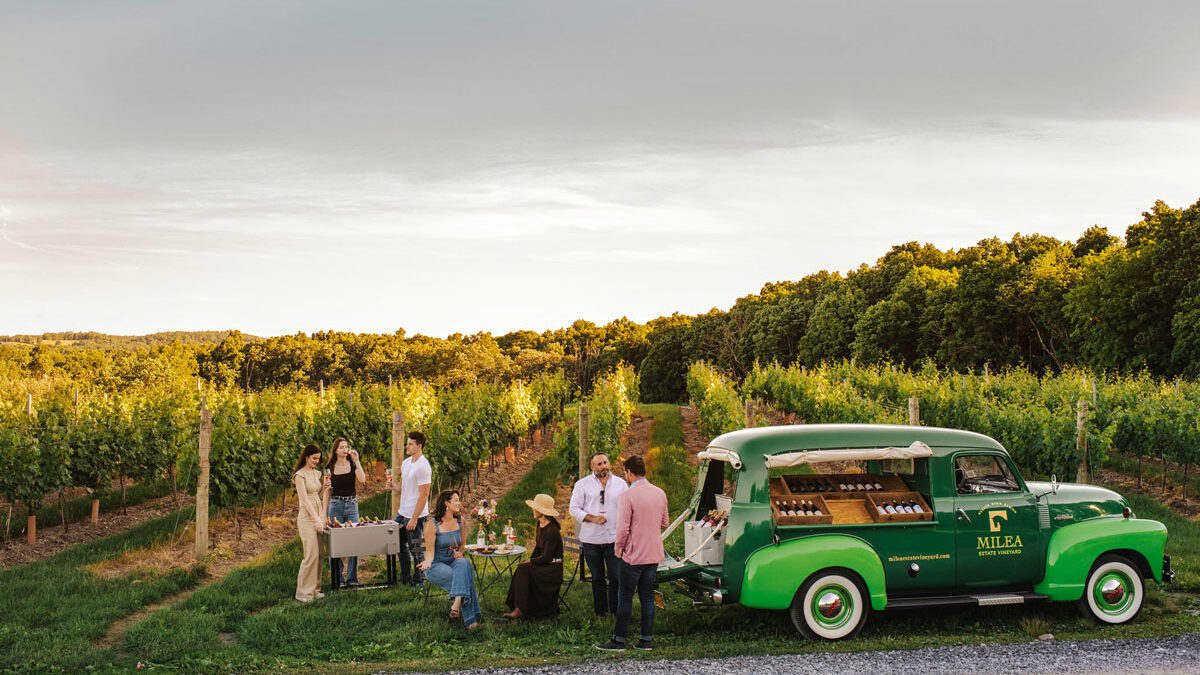
Black Dirt Distillery: Warwick’s Black Dirt Distillery is a product of elder sibling Warwick Valley Winery and Distillery’s success. After demand for the farm-to-glass Black Dirt Bourbon and Black Dirt Apple Jack outstripped Warwick Valley’s capacity, a new biz was born in 2012, and now produces 60+ barrels of whiskey or apple jack every week.
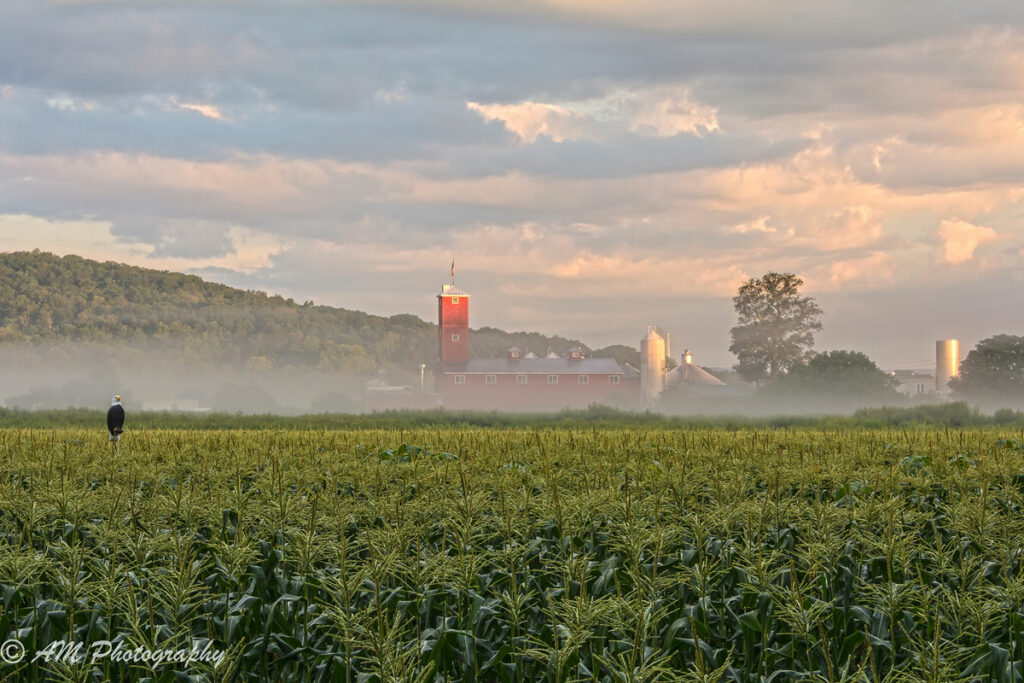
Klocke Estate: This earth-to-glass brandy distillery, farm, and dining destination utilizes regenerative, sustainable agriculture on its 60 acres of vineyards and apple orchards in Claverack. Klocke grows 43 varieties of apples and 9 varieties of grapes. The estate’s brandy is made in the grand tradition of Dutch Brandewijn, filtered through a Hudson Valley lens, of course.
Whitecliff Vineyard & Winery: The founders of Whitecliff Vineyard & Winery are the forefathers of the premium wine movement in the Hudson Valley. Today, they farm more than 20 varieties of grapes in Gardiner and Hudson. Whitecliff’s Cabernet Franc, Riesling, and Sparkling Cuvee receive consistently high (90+ point) ratings from Wine Enthusiast and the like.
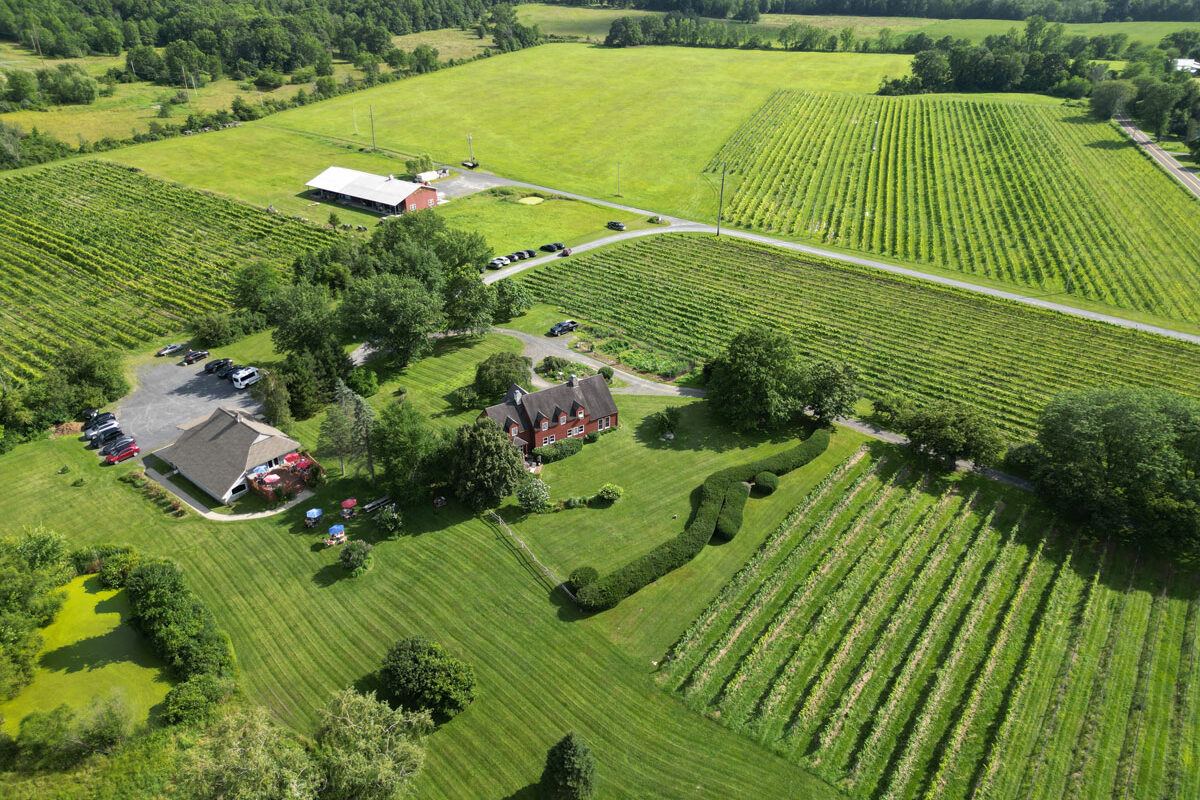
Sustainability in the City
Upon entering Happy Cork, Sunshine Foss’s independent wine and spirits shop on the border of Bed-Stuy and Crown Heights, customers are greeted not only by a smiling sales associate but by a warm and relaxed shopping environment. It’s a rarity in an area where many shops keep their inventory locked up behind bulletproof glass. “You feel welcome,” Foss says, “like the place was actually created for you.”
Every detail of the Happy Cork experience is highly curated, from the scented candles and in-store playlists to the reclaimed wood racks and shelves that display the merchandise. Foss and her team stock the store’s shelves based on quality: Each bottle featured in the store goes through a lengthy selection process involving taste tests, talks with distributors, and more. “I’ve even gone as far as having brands completely redo their labels so that they can get in,” Foss says.
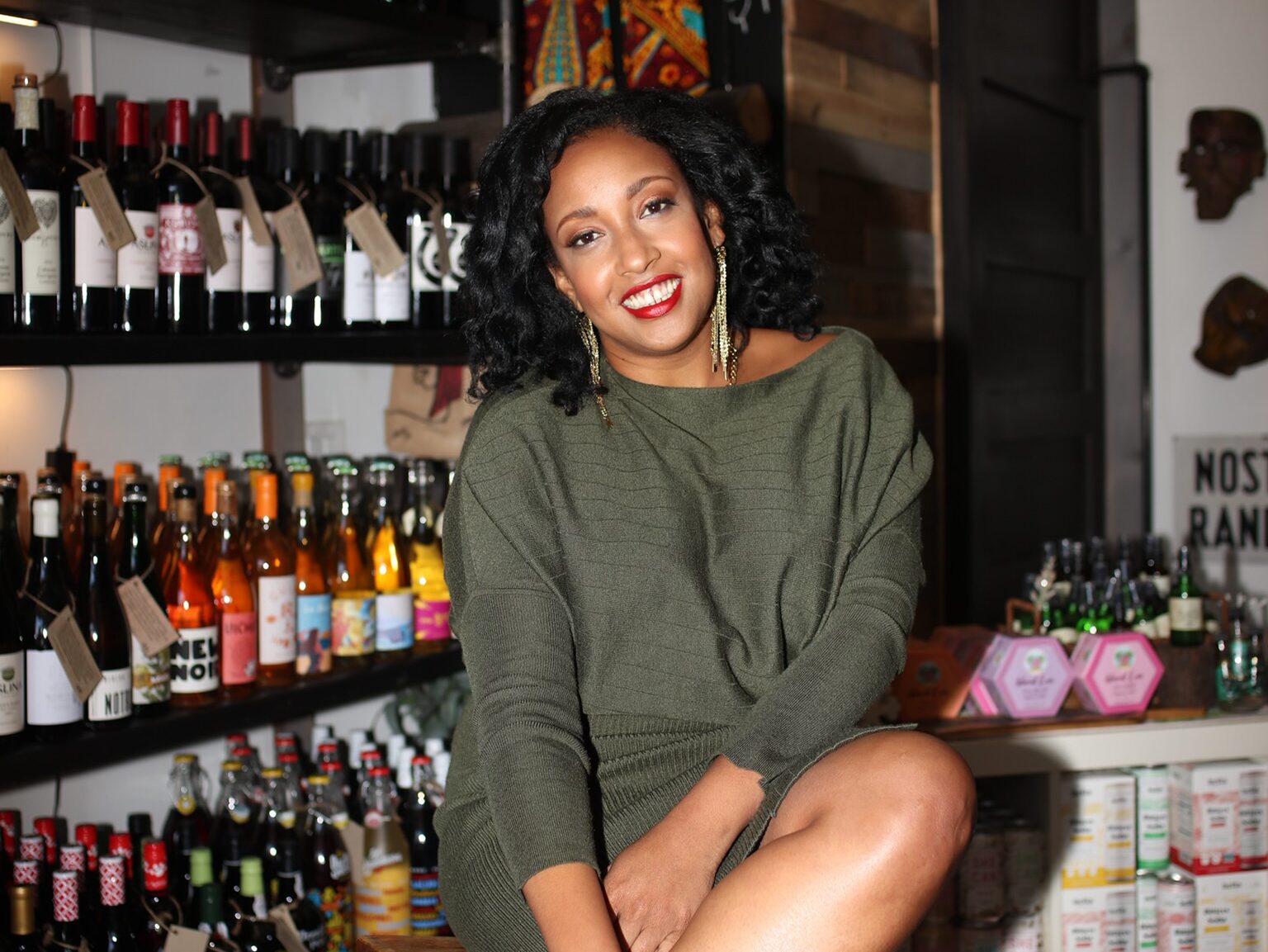
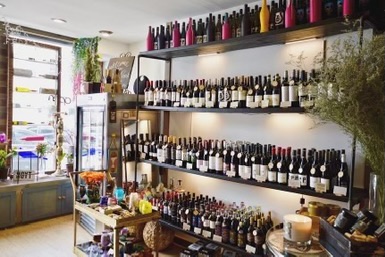
The selection process isn’t just about creating exclusivity, it’s about building opportunities to amplify the voices of local producers, as well as women- and BIPOC-owned brands from around the world. Opting for quality above all else, Foss is passionate about working intentionally with story-driven, detail-oriented brands producing unique wines and spirits that are worthy of her diverse clientele.
“New Yorkers love spending a good bit of change,” she says, “but you got to give them something that is worth spending the change.”
Foss helpfully points out a few of those things, made right there in Brooklyn: Wandering Barman’s pre-batched drinks, each handmade with premium spirits and expertly blended with house-made bitters, syrups, and infusions. Meanwhile, Ocean Hill Apple Brandy—whose freshly harvested apples, exclusively from the Hudson Valley, are pressed by a cider mill on Long Island before being filtered, fermented, and double-distilled by hand in Brooklyn—is “one of the smoothest brandies that you’re ever gonna have,” Foss says.



